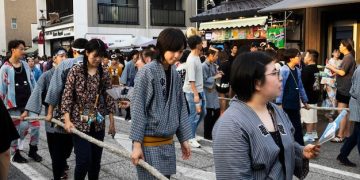Mastering Japanese Bargaining: Tips for US Travelers to Save 15%

Mastering Japanese Bargaining involves understanding cultural nuances, employing polite language, researching prices beforehand, and being prepared to walk away, potentially saving US travelers up to 15%.
Planning a trip to Japan and hoping to snag some deals? Mastering Japanese Bargaining: Proven Techniques for US Travelers to Negotiate Prices Down by 15% might seem daunting, but with the right approach, you can save money and enhance your cultural experience.
Understanding the Cultural Context of Bargaining in Japan
Bargaining in Japan differs significantly from other countries. Direct negotiation isn’t as common, and maintaining respect is paramount. Understanding these cultural nuances is the first step to successfully negotiating prices.
While blatant haggling is often frowned upon, there are subtle ways to achieve discounts. Being aware of the appropriate times and places to negotiate is crucial for a positive experience.
The Importance of Politeness and Respect
Politeness is highly valued in Japanese culture. Starting with a friendly greeting and using polite language throughout any interaction is essential when attempting to bargain. Avoid being aggressive or demanding.
- Always use polite language such as “Kudasai” (please) and “Arigato” (thank you).
- Show respect for the shopkeeper and their merchandise.
- Be patient and understanding.
Acceptable Scenarios for Negotiation
While bargaining isn’t universally accepted, there are specific situations where it is more appropriate, such as at flea markets, independent shops, and when purchasing multiple items. Knowing when to try negotiating will significantly increase your chances of success.

Bargaining at flea markets and with independent vendors is more acceptable. It’s also more common when purchasing multiple items or if an item has a minor defect.
In summary, a respectful and understanding approach is key when considering bargaining in Japan. Knowing where and when it’s appropriate sets the stage for potentially saving money while respecting Japanese culture.
Before You Start: Research and Planning for Japanese Bargaining
Effective bargaining starts long before you enter a shop or market. Thorough research and planning will provide you with the knowledge and confidence needed to negotiate successfully. Knowing the market rate and understanding pricing strategies will give you a significant advantage.
Know the Market Rate
Researching the average price of items you’re interested in is critical. This helps you understand whether a price is inflated and gives you a baseline for negotiation. Use online resources, local shops, and tourist information centers to gather pricing data.
Comparing prices across different stores and online platforms is a great way to gauge the fair market value of an item.
Set a Budget and Stick to It
Before heading out to shop, set a budget for each item. This prevents overspending and helps you stick to your bargaining limits. Having a clear budget also gives you the confidence to walk away if the price isn’t right.
- Determine the maximum you’re willing to pay for each item.
- Be prepared to walk away if the price exceeds your budget.
- Track your spending to stay within your overall travel budget.
Learn Basic Japanese Phrases for Bargaining
Knowing key Japanese phrases can significantly enhance your bargaining efforts. It shows respect for the local culture and can often lead to more favorable outcomes. Even a few basic phrases can make a positive impression.
Learning to say “How much is it?” (Ikura desu ka?) and “Is there a discount?” (Waribiki arimasu ka?) can be incredibly helpful.

In essence, preparation is vital for effective bargaining. Knowing the market rate, setting a budget, and learning basic Japanese phrases will equip you with the tools needed to negotiate successfully and respectfully.
Effective Communication Techniques for Bargaining in Japan
Effective communication is key to successful bargaining, especially in a culture that values politeness. Understanding and using the right language and body language can make a significant difference in your negotiation efforts.
Body language and non-verbal cues play a crucial role. Being aware of how you present yourself can influence the outcome of your interactions.
Using Polite Language
Employing polite language is crucial for establishing a positive rapport. Start with a friendly greeting and use respectful terms throughout the negotiation. Simple phrases like “please” and “thank you” go a long way in Japanese culture.
- Use “Sumimasen” (excuse me) to get attention politely.
- Always say “Arigato gozaimasu” (thank you very much) regardless of the outcome.
- Combine phrases such as “Sumimasen, waribiki arimasu ka?” (Excuse me, is there a discount?).
Reading Body Language and Non-Verbal Cues
Pay attention to the shopkeeper’s body language. Their facial expressions and gestures can provide insights into their willingness to negotiate. Recognizing non-verbal cues can help you adjust your approach accordingly.
A friendly smile and open posture often indicate a willingness to negotiate, while closed-off body language might suggest otherwise.
Asking for Discounts Respectfully
When asking for a discount, frame your request politely and respectfully. Avoid being demanding or aggressive. A gentle approach is more likely to yield positive results. For example, consider asking if there are any discounts available for multiple purchases.
In conclusion, polite language and careful attention to body language are essential tools for effective communication. Using these techniques can improve your chances of successful negotiation while maintaining cultural sensitivity.
Strategies for Negotiating Prices Effectively
Successful bargaining requires a strategic approach. Knowing when and how to make your offer can significantly impact the outcome. Several proven strategies can help you negotiate prices effectively while respecting Japanese customs.
Timing and the way you present your offer are crucial. Understanding these elements can improve your negotiation success.
Bundling Purchases for a Better Deal
Buying multiple items is a great way to leverage a discount. Shopkeepers are often more willing to offer a lower price when you’re making a larger purchase. Bundling purchases shows interest and commitment, increasing your bargaining power.
- Inquire about discounts for purchasing multiple items at once.
- Combine smaller purchases to reach a threshold for a discount.
- Express genuine interest in multiple items to increase your leverage.
Pointing Out Minor Flaws or Imperfections (Tactfully)
If you notice a minor flaw or imperfection, you can tactfully point it out as a reason for a discount. However, be very gentle and respectful, as highlighting flaws aggressively can be seen as rude. Focus on the imperfection’s impact on your satisfaction, rather than being accusatory.
Mention the flaw politely and ask if a discount is possible due to the imperfection.
Using the “Walk Away” Technique
Being prepared to walk away is a powerful negotiation tactic. If the shopkeeper is unwilling to meet your price, politely express your thanks and start to leave. Often, they may reconsider and offer a better deal rather than lose the sale, but be genuinely prepared to leave if necessary.
The “walk away” technique demonstrates that you have a budget and are willing to adhere to it.
In brief, strategic negotiation involves bundling purchases, tactfully pointing out flaws, and being prepared to walk away. These techniques can help you achieve better deals while respecting cultural norms.
Cultural Nuances and Avoiding Common Mistakes
Navigating cultural nuances is critical for a positive bargaining experience in Japan. Awareness of local customs and avoiding common mistakes can enhance your interactions and lead to more favorable outcomes.
Understanding cultural sensitivities is crucial for avoiding unintended offense and maintaining positive relationships.
Understanding “Honne” and “Tatemae”
“Honne” refers to one’s true feelings, while “Tatemae” is the behavior and opinions expressed in public. Japanese communication often involves understanding the unspoken meaning behind words. Recognize that a shopkeeper may be hesitant to directly refuse a discount due to “Tatemae,” so observe their body language and tone carefully.
Being attuned to “Honne” and “Tatemae” can provide insights into the shopkeeper’s true position.
Respecting Shopkeepers and Their Merchandise
Always treat shopkeepers and their merchandise with the utmost respect. Avoid touching items without permission and handle them carefully if invited to do so. Showing reverence for their goods can create a more positive environment for negotiation.
- Ask permission before touching or examining merchandise.
- Handle items with care and avoid causing any damage.
- Compliment the quality and craftsmanship of the items.
Knowing When Not to Bargain
There are situations where bargaining is simply not appropriate. Avoid attempting to negotiate prices at department stores, upscale boutiques, or restaurants. Recognizing these scenarios helps maintain respect and avoid causing offense.
In summary, understanding “Honne” and “Tatemae,” respecting shopkeepers and their merchandise, and knowing when not to bargain are key elements of cultural sensitivity. These practices can enhance your overall shopping experience and help you avoid common pitfalls.
Real-Life Examples and Success Stories
Hearing about real-life examples and success stories can provide inspiration and practical insights for negotiating prices in Japan. These anecdotes highlight the effectiveness of various techniques and offer encouragement for US travelers.
Learning from others’ experiences can boost confidence and provide valuable strategies for your own negotiations.
Anecdote 1: Bargaining at a Flea Market
A US traveler visited a local flea market in Kyoto and found a vintage kimono they loved. The initial price was 10,000 yen. Using polite language and expressing genuine admiration, they inquired if a discount was possible since it was a bit worn. The vendor appreciated their respectful approach and offered it for 8,500 yen, saving them 15%.
This story demonstrates the effectiveness of politeness and tact when pointing out minor flaws.
Anecdote 2: Bundling Purchases at an Independent Shop
Another traveler was shopping at an independent crafts shop in Tokyo. They were interested in purchasing several small souvenirs. They politely inquired if a discount was available for buying multiple items. The shopkeeper, happy with the larger sale, offered a 10% discount on the total purchase, which amounted to approximately 1,200 yen in savings.
- This shows the advantages of bundling purchases.
- Making multiple item purchase will increase your leverage.
- If they are happy with the larger sale, they may offer discounts.
Anecdote 3: Walking Away From an Unreasonable Price
A US tourist was looking to buy a specific teapot in Osaka. The initial price seemed inflated compared to online research. They politely thanked the shopkeeper and began to leave, expressing that it was slightly out of their budget. The shopkeeper quickly reconsidered and offered a lower price, ultimately meeting the traveler’s budget and securing the sale.
Being prepared to walk away can be a powerful motivator for shopkeepers to reconsider their prices.
| Key Point | Brief Description |
|---|---|
| 😊 Politeness | Use respectful language and gestures. |
| 💰 Research | Know the market rate beforehand. |
| 🛍️ Bundling | Buy multiple items for discounts. |
| 🚶 Walk Away | Be prepared to leave if the price is too high. |
FAQ
▼
Bargaining is not as common as in some other countries, but it’s acceptable in certain situations like flea markets or independent shops. Politeness and respect are key when attempting to negotiate.
▼
Useful phrases include “Ikura desu ka?” (How much is it?) and “Waribiki arimasu ka?” (Is there a discount?). Using polite language is highly appreciated and can improve your chances.
▼
Bargaining is generally more acceptable at flea markets, smaller mom-and-pop shops, and when purchasing multiple items. Department stores and upscale boutiques usually have fixed prices.
▼
If a shopkeeper is firm on the price, politely thank them and be prepared to walk away. This shows you have a budget and are serious, which might prompt them to reconsider.
▼
While savings can vary, aiming for a 10-15% discount is reasonable in appropriate settings. The key is to be polite, informed, and prepared to walk away if needed.
Conclusion
Mastering Japanese Bargaining: Proven Techniques for US Travelers to Negotiate Prices Down by 15% is attainable with cultural sensitivity, strategic communication, and preparation. By understanding cultural nuances, researching prices, using polite language, and being ready to walk away, US travelers can successfully negotiate prices and enhance their shopping experiences in Japan, potentially saving up to 15%.





